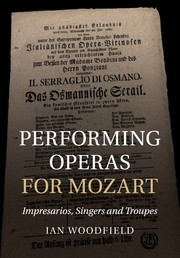Book contents
- Frontmatter
- Contents
- Illustrations
- Figures
- Tables
- Musical examples
- Abbreviations
- Introduction
- 1 Pasquale Bondini
- 2 Die Entführung aus dem Serail
- 3 The Italian troupe in Prague
- 4 The Prague Figaro
- 5 The genesis of Don Giovanni
- 6 The première of Don Giovanni
- 7 The casting of Don Giovanni
- 8 The Leipzig Don Giovanni
- 9 The 1788 Prague Don Giovanni
- 10 Mozart’s music in Leipzig
- 11 Josepha Duschek’s academy (22 April 1788)
- 12 Mozart’s academy (12 May 1789)
- 13 Guardasoni in Warsaw
- 14 The première of La clemenza di Tito
- 15 The Leipzig reception of the Da Ponte operas (1792–1794)
- 16 Guardasoni diversifies
- Conclusion
- Appendices
- Bibliography
- Index
3 - The Italian troupe in Prague
Published online by Cambridge University Press: 05 January 2012
- Frontmatter
- Contents
- Illustrations
- Figures
- Tables
- Musical examples
- Abbreviations
- Introduction
- 1 Pasquale Bondini
- 2 Die Entführung aus dem Serail
- 3 The Italian troupe in Prague
- 4 The Prague Figaro
- 5 The genesis of Don Giovanni
- 6 The première of Don Giovanni
- 7 The casting of Don Giovanni
- 8 The Leipzig Don Giovanni
- 9 The 1788 Prague Don Giovanni
- 10 Mozart’s music in Leipzig
- 11 Josepha Duschek’s academy (22 April 1788)
- 12 Mozart’s academy (12 May 1789)
- 13 Guardasoni in Warsaw
- 14 The première of La clemenza di Tito
- 15 The Leipzig reception of the Da Ponte operas (1792–1794)
- 16 Guardasoni diversifies
- Conclusion
- Appendices
- Bibliography
- Index
Summary
The Italian opera company in Prague occupied a dominant position in Bohemian musical life until well into the new century. Its summer season in Leipzig usually lasted four months from April or May through to the end of August. (In all, eight visits were made in 1782–4, 1786, 1788 and 1792–4.) With only two cities to serve and a single genre to present (opera buffa), the Italian opera company was relatively straightforward to manage, but it was not immune from the complex politics of German theatre, if only because it shared some of the same performing venues. The circumstances in which it staged productions of Figaro and Don Giovanni were influenced in particular by the question of Bondini’s lease of the Nostitz Theatre in Prague. The original agreement in 1783 was widely noted, but critics were not sanguine about the impresario’s chances of making money. The report in the Berlin Litteratur- und Theater-Zeitung, copied in the Journal von und für Deutschland with minor variants, doubted whether he would be successful, partly because of the size of the rent, but also because Prague was deemed to be too large for one theatre but too small to sustain two. Surprisingly, the difficulty of travelling between the two parts of the city across the Moldova was also cited as a factor, as was the supposedly diminishing enthusiasm of the aristocracy for Italian opera, a cliché in commentaries on Bohemian musical life at this period. The troubled circumstances in which the impresario had to apply for a renewal were outlined fully by Teuber. The original agreement signed on 1 October 1783 was to run until Easter 1787. Teuber reprints the full contract, but later refers to a one-year extension granted on 10 March 1786 in the wake of the fiasco over the Zweyte Bondinische Gesellschaft. It is not made clear how this agreement (the text of which is not reproduced) relates to the original contract. A further one-year extension was granted, beginning in May 1787. Again, no text is given, but in this case there is independent confirmation of the uncertainty preceding the renewal, as early in 1787 the Prager Oberpostamtszeitung regretted that the opera company was about to leave. It is likely that this was the reason why the ITS was informed of the company’s plan to perform in Leipzig at Easter 1787, leaving the summer season to be provided by a different ensemble. In the event, however, it was able to retain its Prague base for a further year, and during the course of this extension it gave the première of Don Giovanni.
- Type
- Chapter
- Information
- Performing Operas for MozartImpresarios, Singers and Troupes, pp. 32 - 54Publisher: Cambridge University PressPrint publication year: 2011



